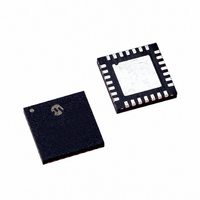PIC16F76-I/ML Microchip Technology, PIC16F76-I/ML Datasheet - Page 106

PIC16F76-I/ML
Manufacturer Part Number
PIC16F76-I/ML
Description
IC MCU FLASH 8KX14 A/D 28QFN
Manufacturer
Microchip Technology
Series
PIC® 16Fr
Datasheets
1.PIC16F616T-ISL.pdf
(8 pages)
2.PIC16F688T-ISL.pdf
(688 pages)
3.PIC16F818-ISO.pdf
(6 pages)
4.PIC16F73-ISP.pdf
(174 pages)
5.PIC16F73-ISP.pdf
(14 pages)
6.PIC16F73-ISP.pdf
(12 pages)
Specifications of PIC16F76-I/ML
Core Processor
PIC
Core Size
8-Bit
Speed
20MHz
Connectivity
I²C, SPI, UART/USART
Peripherals
Brown-out Detect/Reset, POR, PWM, WDT
Number Of I /o
22
Program Memory Size
14KB (8K x 14)
Program Memory Type
FLASH
Ram Size
368 x 8
Voltage - Supply (vcc/vdd)
4 V ~ 5.5 V
Data Converters
A/D 5x8b
Oscillator Type
External
Operating Temperature
-40°C ~ 85°C
Package / Case
28-VQFN Exposed Pad, 28-HVQFN, 28-SQFN, 28-DHVQFN
Processor Series
PIC16F
Core
PIC
Data Bus Width
8 bit
Data Ram Size
368 B
Interface Type
I2C, SPI, USART
Maximum Clock Frequency
20 MHz
Number Of Programmable I/os
22
Number Of Timers
3 bit
Operating Supply Voltage
2 V to 5.5 V
Maximum Operating Temperature
+ 85 C
Mounting Style
SMD/SMT
3rd Party Development Tools
52715-96, 52716-328, 52717-734
Development Tools By Supplier
ICE2000, DM163022
Minimum Operating Temperature
- 40 C
On-chip Adc
5 bit
For Use With
XLT28QFN4 - SOCKET TRANS ICE 28QFN W/CABLEAC164322 - MODULE SOCKET MPLAB PM3 28/44QFN
Lead Free Status / RoHS Status
Lead free / RoHS Compliant
Eeprom Size
-
Lead Free Status / Rohs Status
Details
Other names
PIC16F76-I/MLR
PIC16F76-I/MLR
PIC16F76I/ML
PIC16F76-I/MLR
PIC16F76I/ML
- PIC16F616T-ISL PDF datasheet
- PIC16F688T-ISL PDF datasheet #2
- PIC16F818-ISO PDF datasheet #3
- PIC16F73-ISP PDF datasheet #4
- PIC16F73-ISP PDF datasheet #5
- PIC16F73-ISP PDF datasheet #6
- Current page: 106 of 688
- Download datasheet (3Mb)
PICmicro MID-RANGE MCU FAMILY
6.3.4
DS31006A-page 6-12
Indirect Addressing, INDF, and FSR Registers
Indirect addressing is a mode of addressing data memory where the data memory address in
the instruction is not fixed. An SFR register is used as a pointer to the data memory location that
is to be read or written. Since this pointer is in RAM, the contents can be modified by the pro-
gram. This can be useful for data tables in the data memory.
indirect addressing. This shows the moving of the value to the data memory address specified
by the value of the FSR register.
Indirect addressing is possible by using the INDF register. Any instruction using the INDF register
actually accesses the register pointed to by the File Select Register, FSR. Reading the INDF reg-
ister itself indirectly (FSR = '0') will read 00h. Writing to the INDF register indirectly results in a
no-operation (although status bits may be affected). An effective 9-bit address is generated by
the concatenation of the IRP bit (STATUS<7>) with the 8-bit FSR register, as shown in
Figure 6-7: Indirect Addressing
Instruction
Executed
Instruction
Fetched
Opcode
Opcode
Address != 0
RP1:RP0
2
Address
File
9
7
9
Address = 0h
File Address = INDF
IRP
9
Figure 6-7
FSR
RAM
1997 Microchip Technology Inc.
shows the operation of
Figure
6-8.
Related parts for PIC16F76-I/ML
Image
Part Number
Description
Manufacturer
Datasheet
Request
R

Part Number:
Description:
IC MCU FLASH 8KX14 A/D 28SOIC
Manufacturer:
Microchip Technology
Datasheet:

Part Number:
Description:
IC MCU FLASH 8KX14 A/D 28DIP
Manufacturer:
Microchip Technology
Datasheet:

Part Number:
Description:
IC MCU FLASH 8KX14 A/D 28SSOP
Manufacturer:
Microchip Technology
Datasheet:

Part Number:
Description:
IC MCU FLASH 8KX14 W/AD 28 SOIC
Manufacturer:
Microchip Technology

Part Number:
Description:
IC MCU FLASH 8KX14 W/AD 28DIP
Manufacturer:
Microchip Technology

Part Number:
Description:
IC MCU FLASH 8KX14 W/AD 28SSOP
Manufacturer:
Microchip Technology

Part Number:
Description:
IC MCU FLASH 8KX14 A/D 28SOIC
Manufacturer:
Microchip Technology
Datasheet:

Part Number:
Description:
IC MCU FLASH 8KX14 A/D 28SSOP
Manufacturer:
Microchip Technology
Datasheet:

Part Number:
Description:
14 KB Flash, 368 RAM, 25 I/O 28 QFN 6x6mm TUBE
Manufacturer:
Microchip Technology
Datasheet:

Part Number:
Description:
28 PIN, 14KB STD FLASH, 368 RAM, 22 I/O,
Manufacturer:
Microchip Technology
Datasheet:

Part Number:
Description:
3.5KB Flash, 128B RAM, 18 I/O, CLC, CWG, DDS, 10-bit ADC 20 QFN 4x4mm TUBE
Manufacturer:
Microchip Technology
Datasheet:

Part Number:
Description:
3.5KB Flash, 128B RAM, 18 I/O, CLC, CWG, DDS, 10-bit ADC 20 PDIP .300in TUBE
Manufacturer:
Microchip Technology
Datasheet:

Part Number:
Description:
3.5KB Flash, 128B RAM, 18 I/O, CLC, CWG, DDS, 10-bit ADC 20 SOIC .300in TUBE
Manufacturer:
Microchip Technology
Datasheet:

Part Number:
Description:
3.5KB Flash, 128B RAM, 18 I/O, CLC, CWG, DDS, 10-bit ADC 20 SSOP .209in TUBE
Manufacturer:
Microchip Technology
Datasheet:

Part Number:
Description:
3.5KB Flash, 128B RAM, 18 I/O, CLC, CWG, DDS, 10-bit ADC 20 QFN 4x4mm TUBE
Manufacturer:
Microchip Technology
Datasheet:










